League of Women Voters Asks the Questions at Goleta Candidates’ Second Forum
Contenders Go Head-to-Head on Revenue, Hotels, Bishop Ranch
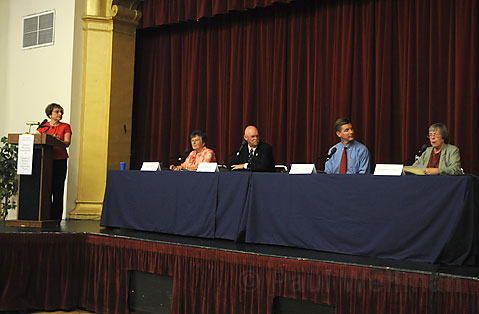
Candidates for Goleta’s two open City Council seats-incumbent Jean Blois, former councilmember Margaret Connell, current Planning Commissioner Ed Easton, and businessman Don Gilman-convened for a second question-and-answer session on Wednesday evening, October 1. This time, the event, once again at the Goleta Valley Community Center, was hosted by the League of Women Voters, but questions ran along similar lines as those asked of candidates on September 10.
Issues ranged from changes to the city’s General Plan, to revenue neutrality, and, inevitably, to what is the most appropriate way to generate revenue in the small metropolis.
What follows is a wrap-up of a few of the specific topics covered at the forum.
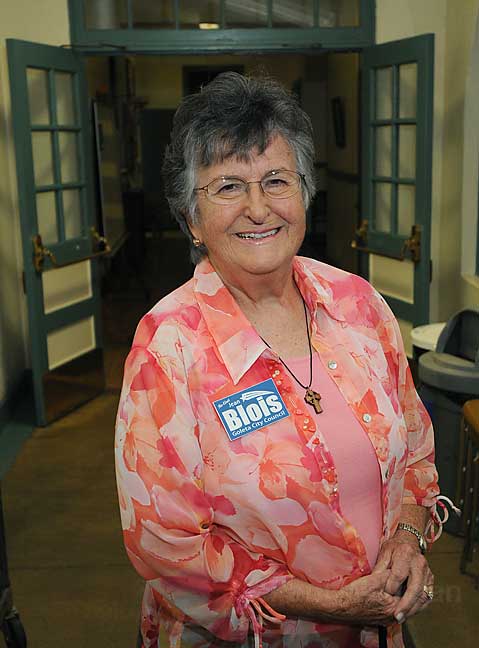
The effect of amendments to the General Plan upon the city’s future:
Easton, who deals with the General Plan on a regular basis when reviewing development projects at the Goleta Planning Commission, said that many of the proposed amendments removed environmental constraints and could be detrimental to the overall needs of the city. “What we’re talking about here is removing environmental restrictions so developers can make more money,” he said. “What we’re talking about is changes to the intensity of development we’re used to in this city.”
Gilman disagreed with the approach backed by Connell and Easton-which embraces minor tweaks rather than major changes to make the document work better-and said the “cookie cutter” manner with which the plan approaches development issues lacks flexibility.
Although she too said that the plan needs to be more flexible, Blois disagreed with Gilman’s position on big box stores. Gilman had said that many people he’s spoken with regarding getting a Target in the area said they were in favor of it, and he would do what his constituents wanted. Connell was vehemently opposed to big box stores, saying they hurt local businesses and bring out-of-town traffic.
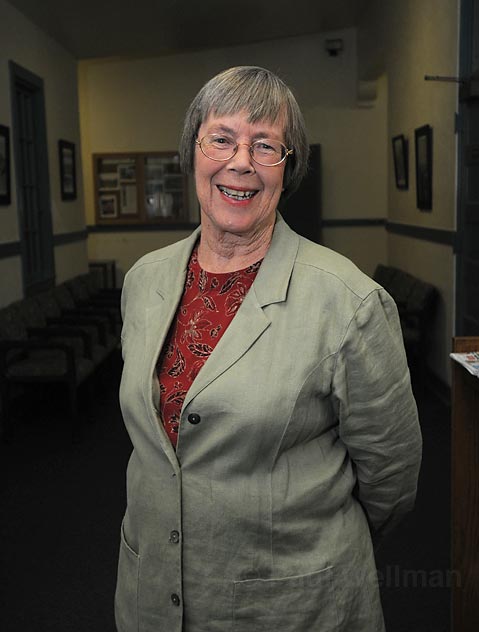
Revenue neutrality:
All of the candidates were in agreement that revenue neutrality needs to be renegotiated with Santa Barbara County. Although most newly incorporated cities in California share tax revenue with their host county for a limited time, Goleta stands alone in that it has no end date for its agreement. However the candidates, who appeared to be evenly divided between Easton-Connell and Blois-Gilman on most issues, were not in accord over the tack that should be used to get the county to agree to something the city can benefit from. “All things flow through revenue neutrality-it’s issue number one,” said Gilman, who has been an outspoken opponent of the current agreement, which he said has lost the city millions of dollars that could be used for a much-needed recreation program. Blois said she had met with county supervisors Joni Grey and Janet Wolf, but that the city was “shut down.” She added, “That’s why we proposed a city sales tax for the November ballot, and that did get their attention.” The sales tax would have hurt chances for the passage of countywide Measure A, which the supervisors desperately want to succeed. After the Goleta City Council pulled the city sales tax ballot initiative from their agenda, the county agreed to forgive the startup loan debt that Goleta owed the county.
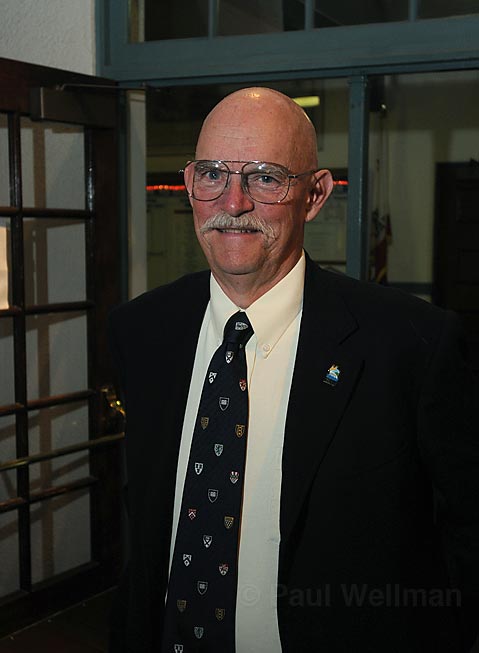
While they said that an end date to revenue sharing with the county was crucial, Connell and Easton favored what they called a more realistic approach to dealing with a county that is not likely to sacrifice a significant and reliable source of income while embroiled in its own budgetary uncertainty. “We have to be careful of what we take,” said Connell, explaining that since the negotiation is give-and-take between the two sides, Goleta should be wary of assuming the expense of something as costly to run and maintain as Goleta Beach, for example. She said that since she has good relationships with county leaders, she thinks she can hammer out a reasonable agreement with them.
Easton said that the fixed-amount strategy pushed by Gilman-in which a set amount of revenue is given to the county every month, to rule out possibly giving the county more than it deserves-was not wise in light of the economic turmoil seen across the country in recent weeks. To eliminate that risk, he favored using a percentage for revenue sharing.
The ideal use for Bishop Ranch:
A plan by Encino-based Larwin Company-owned by part-time Santa Barbara resident Michael Keston-to build a 1,200 home suburban housing development with commercial space, athletic fields, and some conservation easement, was pulled from the City Council’s agenda in July, leaving open the debate over the best use of the land. Some supported the project, and many called for the land’s return to agricultural use, but the 240-acre parcel-bordered by orchard land and once used to grow orchard crops-lost its 100 acre-feet per year water rights when they were sold in 1995 to supply the needs of the Camino Real Marketplace. Therefore, the agricultural use favored by many area residents would be a tricky venture due to a lack of water for irrigation.

Connell suggested subsidizing the rate for water if the land was used for agriculture, and Blois favored a citywide vote to determine the fate of the property. Gilman said that although he would like it to stay agricultural, he also liked certain elements of the Larwin Company project, such as the athletic fields and open space. Easton was adamant that the best use for the piece of land should be determined and then saved as a future option. “Planning is about what goes where, and when,” he said. “We do not need to develop all of Goleta now, and we shouldn’t. We don’t have the infrastructure to support a residential development there.”
Hotels:
Hotels have been a major issue in Goleta as of late, with two being approved by the Planning Commission over the summer. Easton called for more study into the impacts that new hotels will have upon existing ones-he voted for the Rincon Palms Hotel at Storke and Hollister, and against the Marriot Residence Inn. “I don’t believe in intuitive planning,” he said. “I believe in fact-based planning.”
Gilman agreed with that statement, but said that since the General Plan allowed a certain number of hotels to be built, denying them was “disingenuous.”
Connell’s stance was approving hotels on sites zoned for hotel use is acceptable, but only so long as such projects conform to rules set forth by the General Plan.
Dealing with decreased revenue but increased expenses:
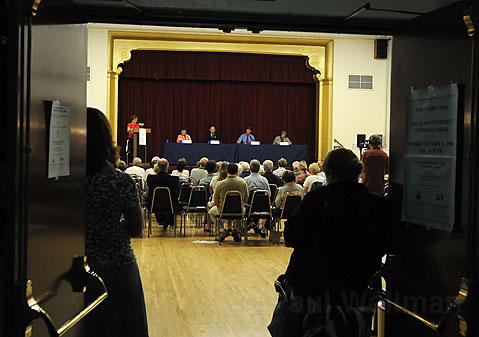
The candidates’ views were diverse on the topic of the city’s finances, with Gilman stating unequivocally that Goleta should be mindful of the current financial crisis on Wall Street. “As a city, we’re pretty limited by revenue neutrality,” he said. Connell and Blois, both having served on the council, said that an adequate reserve has been established by the Finance Department’s careful management of the city’s funds. However, Blois said that in order for the city to continue being able to pay for roads and public safety, the passage of Measure A will be essential, and the Transit Occupancy Taxes (TOT) from new hotels are needed as well. “The danger : is of the fiscalization of land use,” countered Connell, who, along with Easton, posited that TOT is not the answer to Goleta’s financial challenges. Easton went a step further, saying that Goleta was in fine shape financially, and that careful planning and adequate study of finances would see Goleta through.


